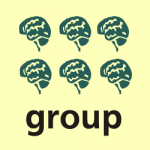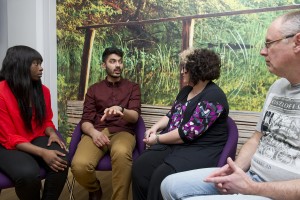
Recommendations for the treatment of schizophrenia suggest that a combination of pharmacological and psychological interventions will provide the most effective treatment option. The National Institute for Health and Care Excellence (NICE) currently recommends that people with schizophrenia are offered pharmacological treatments and (where available) specific psychological interventions which include individual cognitive behavioural therapy (CBT), family intervention and group based art therapy (NICE 2014). The Scottish Intercollegiate Guidelines Network (SIGN) made a similar recommendation but with the exclusion of group based art therapy (SIGN 2013).
While much research has focused on individual therapies, the benefits of group psychotherapies for schizophrenia (including CBT, music and art therapies, social skills training etc.) have received less attention from researchers.
In this study, the authors acknowledge that the evidence for group therapy has been limited in scope and often restricted to a descriptive analysis of the literature (Orfanos 2015). The authors suggest that evidence for group CBT links this therapy to an improvement in the social skills displayed by people with schizophrenia and that a group therapy approach will in general increase access to treatment, maintain efficacy and reduce therapeutic costs (Orfanos 2015).
This systematic review aimed to:
- Estimate the effect of different group psychotherapeutic treatments for schizophrenia, and
- Explore whether any overall ‘group effect’ is moderated by treatment intensity, diagnostic homogeneity and therapeutic orientation.

NICE recommends group based art therapy for schizophrenia, but SIGN does not.
Methods
The electronic search included PsychINFO, Medline, Embase and AMED. The author’s hand-searched key journals and references, conducted a grey literature search and contacted authors for outcome data.
Eligible studies included randomised controlled trials, investigations of psychotherapeutic treatments provided under treatment conditions, and studies including participants diagnosed with schizophrenia or related disorders. The criteria for excluding studies included:
- The provision of individualised treatment or family therapy,
- Participants aged under 16 years,
- Less than 85% of participants diagnosed with schizophrenia or related disorders,
- No measure of symptoms or social functioning,
- Written using non-Latin characters, and
- Control measures involved group psychotherapeutic treatment (rather than active sham group) or treatment as usual (TAU).
The authors used the Cochrane Risk of Bias Tool, but excluded the blinding of personnel category from their analysis. A high risk of bias was classified as a study scoring ‘high risk’ in at least four of the six bias categories used.
Outcomes
- Primary outcomes included mean symptom scores at the end of treatment (positive, negative, general and/or total symptom scores) measured as a continuous variable using PANSS
- Secondary outcomes were social functioning scores which were only examined descriptively.
The meta-analysis compared:
- Group psychotherapeutic treatments (as part of the treatment condition) versus TAU
- Group psychotherapeutic treatments versus active sham groups.
A sensitivity analysis excluded studies with a high risk of bias and baseline mean scores that varied across the treatment and control condition.
Meta-regression analysis was conducted to determine the effect of:
- Non-verbal arts therapies versus non-arts therapies
- Cognitive behavioural approaches vs other therapeutic approaches
- Treatment intensity (duration of sessions by hours multiplied by number of sessions offered)
- Diagnosis as a dichotimised variable.
Results
- 34 studies (32 data sets) were included, with 2,634 participants
- 71% of participants were outpatients
- Mean age of 39 years.
A meta-analysis of group psychotherapies versus TAU produced a specific between-group difference for endpoint negative, general and total symptom scores favouring the treatment condition. No effect was noted for positive symptoms.
The analysis provided no evidence of a significant between-group difference for endpoint negative, positive, general or total symptoms when comparing group psychotherapeutic treatment versus an active sham group.
Three studies were identified as being at high risk of bias. The subsequent sensitivity analysis revealed the results were no longer significant for general and total symptoms when the high risk studies were removed. Only a small to moderate effect for negative symptoms remained: Negative symptoms: SMD -0.40 (-0.67 to -0.13), P = 0.004, I2 = 66.6.
The meta-regression analysis for negative symptoms showed that:
- The effect wasn’t due to therapeutic orientation or diagnostic homogeneity
- Treatment intensity moderated the effect.

It’s hard to apply these findings about group psychotherapies and negative symptoms in clinical practice.
Author’s conclusion
This review found that group psychotherapeutic treatments were more effective in reducing negative symptoms than TAU across a diverse range of psychotherapeutic orientations.
The narrative summary of studies indicated that overall, participants in group psychotherapeutic treatments benefitted more in terms of reduced social functioning deficits in the treatment condition compared to TAU.
Strengths and limitations
The authors highlight a number of limitations to their study including:
- The identification of possible publication and completer-only bias
- Moderate to high heterogeneity for negative symptom scores
- A lack of comparison between group and individual psychotherapeutic treatments.
The authors conclude that group therapy may provide a small to moderate beneficial effect for the treatment of negative symptoms, but note that their review is limited in its measurement of symptom outcomes. The clinical meaning of this conclusion is unclear and future studies should clarify what improvement in negative symptoms individuals with schizophrenia can expect when undergoing group therapy.
The conclusion that group psychotherapeutic treatments reduce social functioning deficits is also based on limited data and is not supported by statistical evidence. No meta-analysis was conducted and limited information was provided for each included study. The authors analysed 11 studies, however, it should be noted that one of these (Atkinson 1996) should have been excluded as it was categorised as high risk of bias. Of the remaining ten studies, only five reported a significant effect, each using a different measure of social functioning.
The authors understandably do not employ the blinding part of the risk of bias measure. Group therapy is not easily blinded, but transparency is important and the positive efforts of researchers to address this problem should be noted. Similarly, the issue of potentially interested researchers and participants should also not be ignored (as they wouldn’t be for interested parties participating in drug trials).
The meta-regression suggested that the intensity of treatment was an important factor in the beneficial effect noted, with more ‘intense’ treatments linked to a greater difference in negative symptom scores. However, the studies included varied greatly in the total number of hours offered as part of a treatment package, ranging from 5 to 96 hours. Dividing the studies into short, medium and long-term treatment groups and comparing the benefits of each would provide greater clarity on the optimal intensity of group psychotherapies for negative symptoms.
Summary
This review notes the potential benefits of group psychotherapies for the treatment of the negative symptoms of schizophrenia. It also highlights that more evidence is required to determine whether this therapy offers the most effective treatment option for the symptoms of schizophrenia.

This review notes the potential benefits of group psychotherapies for the treatment of the negative symptoms of schizophrenia.
Links
Primary paper
Orfanos S, Banks C, Priebe S. (2015) Are Group Psychotherapeutic Treatments Effective for Patients with Schizophrenia? A Systematic Review and Meta-Analysis. Psychother Psychosom. 2015;84(4):241-9 [PubMed abstract]
Other references
National Institute for Health and Care Excellence. Psychosis and schizophrenia in adults: prevention and management. 12 February 2014.
Scottish Intercollegiate Guidelines Network (SIGN). Management of schizophrenia. Edinburgh: SIGN; 2013. (SIGN publication no. 131). [March 2013].

Group psychotherapies for schizophrenia https://t.co/9LDfwtWFxJ #MentalHealth https://t.co/YkgTfjSmxz
Today @traceystweets01 asks: Are group psychotherapies effective for people with #schizophrenia? https://t.co/8WJyaiSnro
@Mental_Elf @traceystweets01 many thanks for the blog! @QMULSocialPsych
Group psychotherapies for schizophrenia https://t.co/n1406TeEuX
Group psychological therapies for schizophrenia: great potential but little research https://t.co/JK6Ghaxr6E @Mental_Elf @StavrosOrfanos
How can group CBT, music & art therapies and social skills training help people with #schizophrenia? https://t.co/8WJyaiSnro
Group psychotherapies for #schizophrenia https://t.co/QImcbsbiNg #Evidence review shows potential benefits on reduction of negative symptoms
SR notes the *potential* benefits of group psychotherapies for treatment of negative symptoms of schizophrenia https://t.co/8WJyaiSnro
@Mental_Elf depends on severity. Mum’s paranoid schiz can only b controlled. Worried Schizoid Dis confused with schiz. It’s not the same.
Latest Mental Elf blog on group therapies for schizophrenia
https://t.co/0cd3aEB5rT
@Th3DarkMark @ambermad @sruthikrajeev
Los tratamientos grupales pueden mejorar síntomas negativos y funcionamiento en la esquizofrenia [meta-análisis] https://t.co/sLi6kszxBf
SR suggests that group psychotherapies may help w negative symptoms of schizophrenia, but hard to apply in practice https://t.co/8WJyaiSnro
Don’t miss: Group psychotherapies for schizophrenia https://t.co/8WJyaiSnro